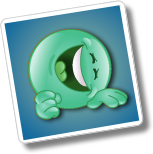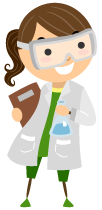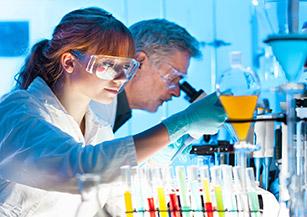Getting Your Own Lab Coat
Careers for you in Science and Research
Are you curious? Do you like numbers? Do you like adventures? If so, maybe you should become a scientist! A good scientist is curious and asks lots of questions, such as
- How does something work?
- What is inside?
- Why does that happen?
Scientists seek answers to these and other questions. The answers help solve problems in our world. If you like numbers, science can be for you too, since scientists make many measurements. Things like length, weight, time, and volume are measured frequently. Numbers are recorded in a book called a "log book" or "record book," and usually are stored and analyzed with the help of a computer. So it's good to like working with a computer too!
Movie heroes like Indiana Jones live lives of high adventure. Scientists experience adventure too, especially when new information is discovered which might explain how something works, or even help cure people of a killing disease. Consider some of the discoveries of science: X-rays; vaccines for dangerous diseases; antibiotics; rocket engines; the transistor; and more recently, a gene which is responsible for breast cancer in humans, discovered by scientists at NIEHS. The scientists and their teams who made these discoveries sense excitement, adventure, and satisfaction because they are understanding how something works for the first time, and maybe solving a serious problem too. These discoveries can also be fun!
Some scientists specialize in studying living things. We call them biologists. Some try to learn more about the ground and the earth. They're called geologists. Physicists are scientists who study physical phenomena such as light or electricity. At NIEHS in the Research Triangle Park in North Carolina, dozens of dedicated toxicologists study the effects of different chemicals on living things. A toxicologist is a specialized type of biologist who investigates chemicals to see if they act as toxins (poisons). These are just a few examples of the many kinds of scientists that make discoveries every day which make life better for all of us. We become healthier, with a better understanding of our world and the other animals and plants that live here with us.
Finally, a good scientist needs to communicate with other scientists through speech and in writing. That means solid skills in English are necessary. Though not easy for many of us, these skills come with time and practice. They'll come to you too and you'll find lots of help from your teachers, advisors, and even other scientists.
Our world needs dedicated science professionals. Maybe you will become one of them! One good way to get started is to ask your teachers for guidance when selecting your future classes and planning your college education. That way you can concentrate on courses that will prepare you for a career as a research scientist! Learn more about how important and exciting a career in environmental health research can be!





